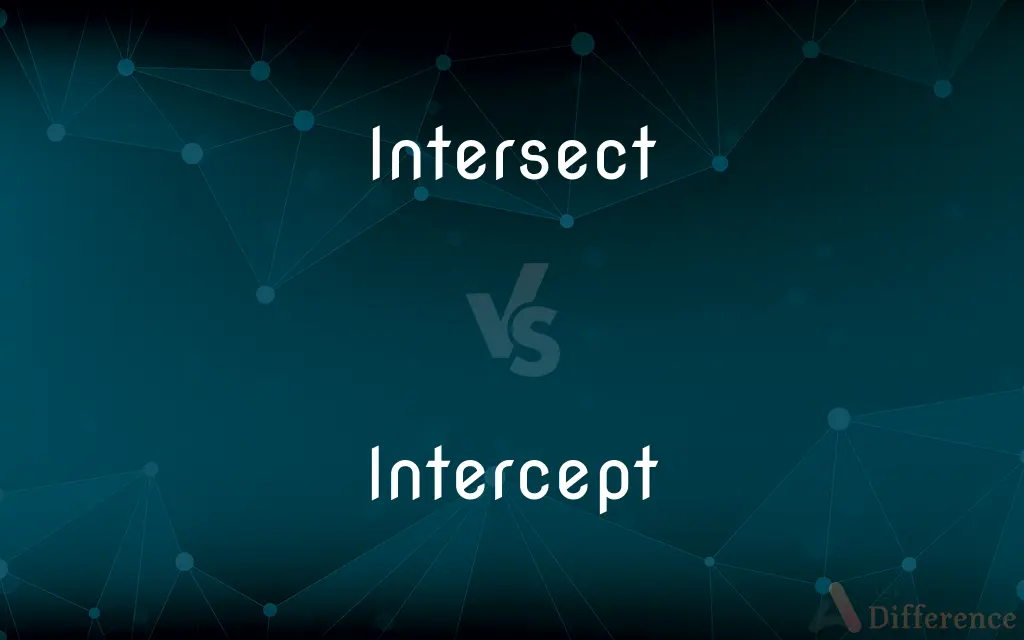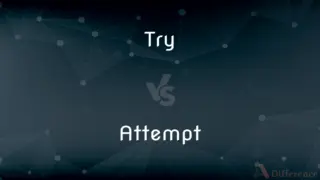Intersect vs. Intercept — What's the Difference?
Edited by Tayyaba Rehman — By Fiza Rafique — Updated on October 24, 2023
"Intersect" means to cross or pass through each other, often at a point. "Intercept" means to stop, seize, or interrupt something or someone's progress.

Difference Between Intersect and Intercept
Table of Contents
ADVERTISEMENT
Key Differences
Intersect and Intercept, though they sound similar, have distinct meanings and applications. The term Intersect relates to the crossing or meeting of lines or paths, implying a passive overlap. On the other hand, Intercept is more active, describing a deliberate action to halt or interrupt.
In geometry, Intersect is used to describe how two or more lines touch or cross each other at a certain point. For instance, two roads might intersect at a junction. Intercept, however, can describe a point on a graph where a line crosses an axis or a segment between two data points.
The term Intersect can also be used in more abstract or metaphorical senses. Two different subjects or discussions might intersect when they share common themes. On the contrary, Intercept generally refers to obstructing something in motion, like intercepting a pass in sports or a message in communication.
From a linguistic standpoint, Intersect can be utilized to denote the shared elements between two distinct groups or categories. Meanwhile, Intercept often denotes a purposeful intervention, such as security forces intercepting contraband.
Lastly, in everyday language, Intersect can be understood as where things come together or overlap, while Intercept suggests an action taken to stop or seize something, preventing it from reaching its intended destination.
ADVERTISEMENT
Comparison Chart
Primary Meaning
To cross or meet at a point.
To stop or seize something in its path.
Field of Usage
Geometry, discussions, paths.
Sports, communication, security.
Nature
Passive overlap.
Active intervention.
Typical Contexts
Lines, roads, discussions.
Ball games, communication signals, cargo.
Metaphoric Use
Sharing common themes.
Purposefully stopping or obstructing something.
Compare with Definitions
Intersect
To have a common point or line.
The circles intersect at two points.
Intercept
To stop, obstruct, or interrupt in progress or course.
He managed to intercept the ball before it reached the goal.
Intersect
To cut or divide by passing through.
The two roads intersect in the middle of the town.
Intercept
To take or seize en route.
The shipment was intercepted at the border.
Intersect
To cross each other.
The lines intersect forming an X shape.
Intercept
To stop, deflect, or interrupt the progress or intended course of
Intercepted me with a message as I was leaving.
Intersect
To meet or converge.
Their lives intersect unexpectedly.
Intercept
To gain possession of (an opponent's pass), as in football or basketball.
Intersect
To share common elements.
The two stories intersect in their themes.
Intercept
To gain possession of a pass made by (an opponent), especially in football.
Intersect
To cut across or through
The path intersects the park.
Intercept
To slow or prevent (precipitation) from reaching the ground. Used of vegetation.
Intersect
To form an intersection with; cross
The road intersects the highway a mile from here.
Intercept
To intersect (a coordinate axis).
Intersect
To cut across or overlap each other
Circles intersecting on a graph.
Intercept
To include or bound (a part of a space or curve) between two points or lines.
Intersect
To form an intersection; cross
These two fences intersect at the creek.
Intercept
(Archaic) To prevent.
Intersect
(ambitransitive) To cut into or between; to cut or cross mutually; to divide into parts.
Parallel lines don't intersect.
Any two diameters of a circle intersect each other at the centre.
Intercept
(Obsolete) To cut off from access or communication.
Intersect
(mathematics) Of two sets, to have at least one element in common.
Intercept
(Mathematics) The point or coordinates at which a line, curve, or surface intersects a coordinate axis.
Intersect
To cut into or between; to cut or cross mutually; to divide into parts; as, any two diameters of a circle intersect each other at the center.
Lands intersected by a narrow frithAbhor each other.
Intercept
The interception of a missile by another missile or an aircraft by another aircraft.
Intersect
To cut into one another; to meet and cross each other; as, the point where two lines intersect.
Intercept
Interception of a radio transmission.
Intersect
Meet at a point
Intercept
An interceptor.
Intercept
(transitive) To stop, deflect or divert (something in progress or motion).
The police intercepted the package of stolen goods while it was in transit.
Intercept
To gain possession of (the ball) in a ball game
Intercept
Of a defensive player: to steal a pass thrown by the opposing team, gaining possession of the ball.
Intercept
To take or comprehend between.
Intercept
An aeronautical action in which a fighter approaches a suspicious aircraft to escort it away from a prohibited area, or approaches an enemy aircraft to shoot it down.
Intercept
An interception of a radio broadcast or a telephone call.
Intercept
An interception of a missile.
Intercept
(algebraic geometry) The coordinate of the point at which a curve intersects an axis.
Intercept
(marketing) A form of market research where consumers are intercepted and interviewed in a retail store or mall.
Intercept
To take or seize by the way, or before arrival at the destined place; to cause to stop on the passage; as, to intercept a letter; a telegram will intercept him at Paris.
God will shortly intercept your breath.
Intercept
To obstruct or interrupt the progress of; to stop; to hinder or oppose; as, to intercept the current of a river.
Who intercepts me in my expedition?
We must meet first, and intercept his course.
Intercept
To interrupt communication with, or progress toward; to cut off, as the destination; to blockade.
While storms vindictive intercept the shore.
Intercept
To include between; as, that part of the line which is intercepted between the points A and B.
Intercept
To overhear or view (a communication or message intended for another), without hindering its passage; as, to intercept a telephone call.
Intercept
To catch and take possession of (a ball passed between members of an opposing team); as, the back intercepted the pass and ran the ball back for a touchdown.
Intercept
A part cut off or intercepted, as a portion of a line included between two points, or cut off two straight lines or curves.
Intercept
The point at which a line intersects a coordinate axis
Intercept
Seize on its way;
The fighter plane was ordered to intercept an aircraft that had entered the country's airspace
Intercept
Tap a telephone or telegraph wire to get information;
The FBI was tapping the phone line of the suspected spy
Is this hotel room bugged?
Intercept
To cut off from an intended destination.
The call was intercepted by unknown hackers.
Intercept
To intersect an axis in mathematics or physics.
The line intercepts the x-axis at (5,0).
Intercept
To obtain or extract information.
Intelligence agencies can intercept encrypted messages.
Common Curiosities
Can "Intersect" and "Intercept" be used interchangeably?
No, while they sound similar, they have different meanings and applications.
Does "Intersect" imply an action?
Not necessarily; it can describe a passive overlap or meeting point.
Is "Intercept" always about physically stopping something?
No, it can also refer to extracting or obtaining information, as in intercepting a message.
Is "Intercept" about deliberate intervention?
Typically, yes. It implies an action taken to stop or obstruct.
Is "Intersect" always about physical paths or lines crossing?
No, it can also be used metaphorically to denote shared themes or commonalities.
Can you "Intersect" an idea?
Not directly, but ideas can intersect when they share commonalities.
Can two groups "Intersect"?
Yes, especially if they have overlapping members or shared elements.
Can "Intercept" be used in sports?
Yes, it's often used in ball games to describe stopping or seizing the ball.
How are "Intersect" and "Intercept" used in geometry?
"Intersect" denotes lines or shapes meeting at a point, while "Intercept" can refer to a line crossing an axis.
Does "Intercept" imply preventing something from its goal?
Generally, yes. It suggests stopping something from reaching its intended destination.
Can "Intercept" be about taking possession?
Yes, it can mean taking or seizing something in its path or en route.
Can discussions or themes "Intersect"?
Yes, they can intersect when they have shared or common elements.
Does "Intersect" have to be at a right angle?
No, any two paths or lines can intersect regardless of the angle.
Are "Intersect" and "Intercept" related etymologically?
Both have Latin roots related to "between" or "among" but diverge in their specific origins.
What's the opposite of "Intercept"?
While there's no direct antonym, "let pass" or "allow through" can convey opposite actions.
Share Your Discovery

Previous Comparison
Try vs. Attempt
Next Comparison
Buy vs. PayAuthor Spotlight
Written by
Fiza RafiqueFiza Rafique is a skilled content writer at AskDifference.com, where she meticulously refines and enhances written pieces. Drawing from her vast editorial expertise, Fiza ensures clarity, accuracy, and precision in every article. Passionate about language, she continually seeks to elevate the quality of content for readers worldwide.
Edited by
Tayyaba RehmanTayyaba Rehman is a distinguished writer, currently serving as a primary contributor to askdifference.com. As a researcher in semantics and etymology, Tayyaba's passion for the complexity of languages and their distinctions has found a perfect home on the platform. Tayyaba delves into the intricacies of language, distinguishing between commonly confused words and phrases, thereby providing clarity for readers worldwide.
















































